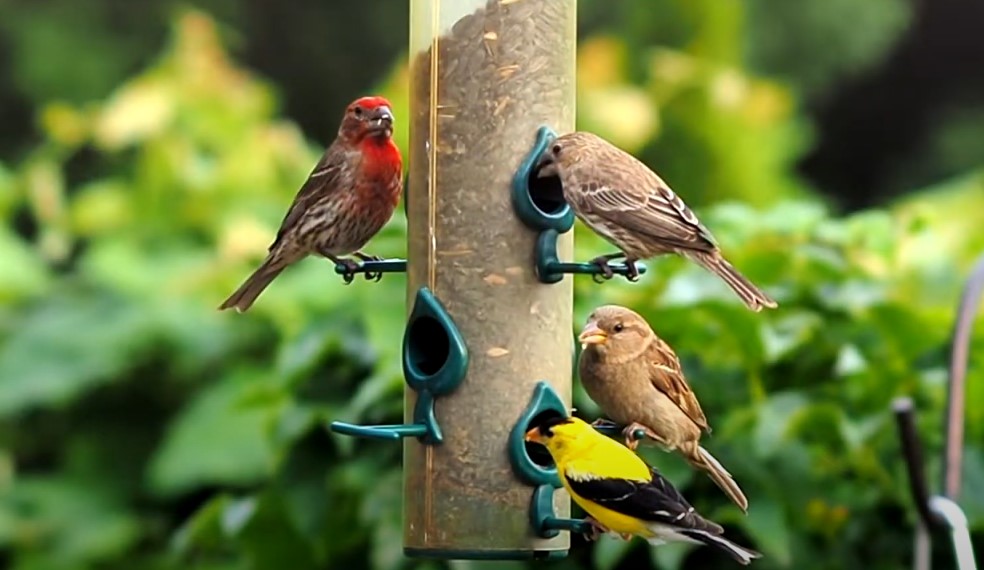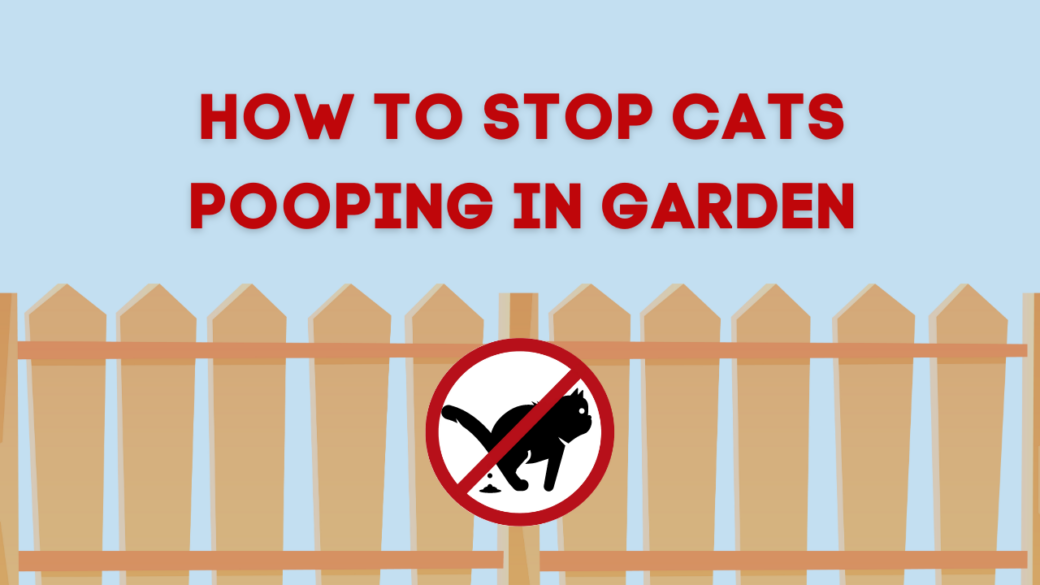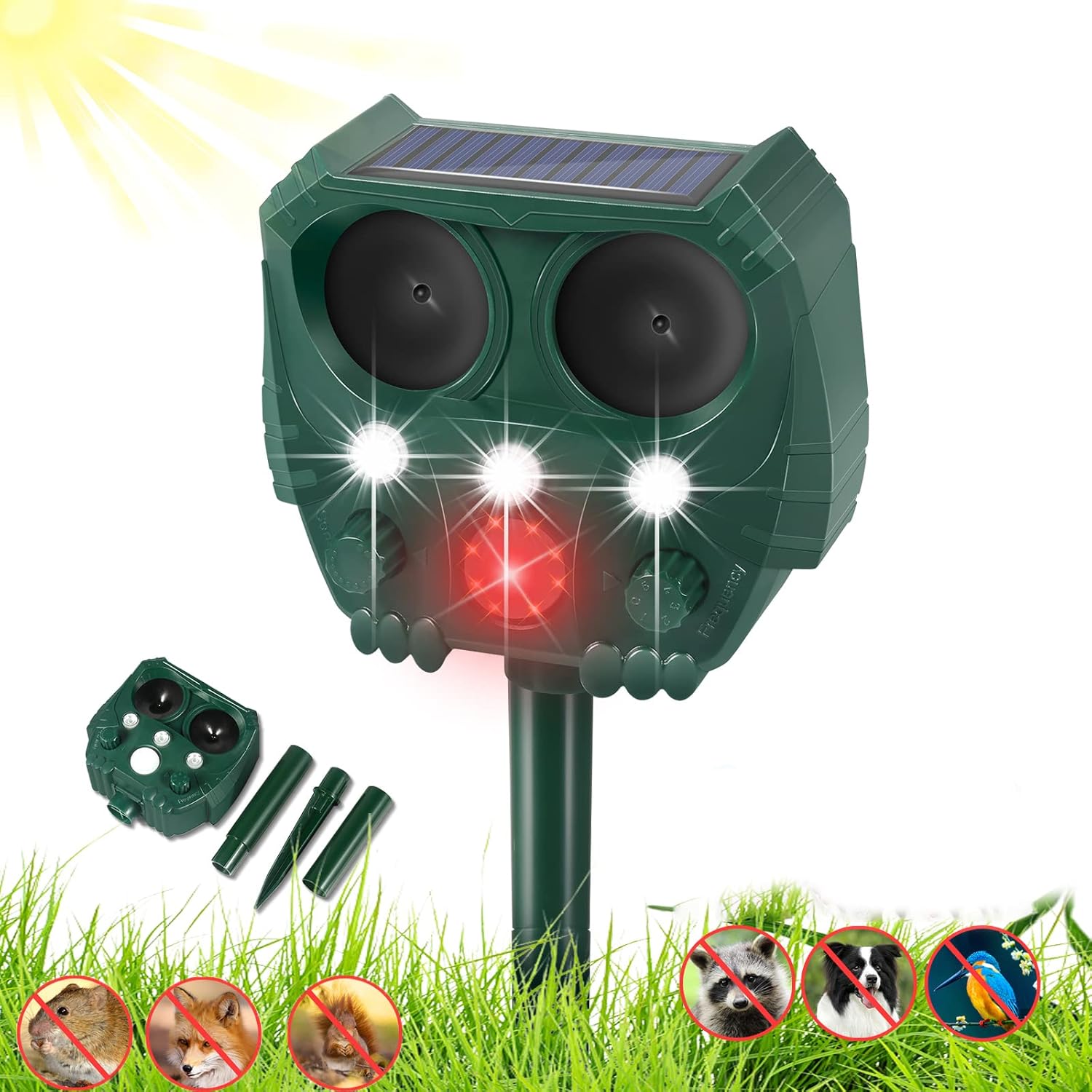HouseholdPets.co.uk is a reader-supported site, meaning if you click on any product links we recommend we may receive a small commission in return.
Cats mainly toilet in gardens to mark their territory, establishing dominance as well as alerting their right to be there to other cats. These animals like to roam, so they can often end up in a garden that is streets away from their home. This makes it even more irritating when they decide to dig up a garden to use as a litter tray.
Thankfully, there are many natural ways to deter an intruding cat from pooping in your garden. It is up to you, as the garden owner, to ensure the methods you use are harmless to both the cat and the environment. Under the Animal Welfare Act 2006, you could be prosecuted if you cause unnecessary suffering to a cat.
Whether it’s your own cat or a neighbour’s cat that keeps paying your garden a visit, there are multiple harmless ways to stop cats pooping in your garden.
Table of Contents
Best 10 Ways to Stop Cats Pooping in Your Garden
When cats begin pooping in your garden, it can be incredibly frustrating. Unlike dogs, there are no repercussions for cat owners who allow their pets to foul in other people’s gardens. So, if you find a cat visiting your garden to go to the loo, you might be wondering what you can do about it.
Household Pets have compiled ten of the best ways to stop cats pooping in the garden.
Clean the Area
The first method to stop cats pooping in the garden is to clean the affected area or areas. If a cat visits the same spot repeatedly, this should be the area you target. It is essential to wear gloves when cleaning the garden of cat poo as it can contain harmful bacteria and parasites, like Toxoplasma Gondii, which can be harmful to pregnant women and people with weak immune systems.
- Step One: Remove all cat poop in the area cats like to visit and bin it. You might need to use a shovel to dig the faeces out of the soil.
- Step Two: Use an eco-friendly cleaning solution and water to disinfect the area. Diluted white vinegar solution and water can also be used.
- Step Three: Rinse the area well.
If cats like to use your patio or decking area, this can be easier to clean. There are products specifically designed to clean and remove odours from patio and decking surfaces. It’s important to keep your garden clean of any evidence of cat waste to avoid cats pooping in the garden repeatedly.
Designed with pet-safe ingredients, the Simple Solution cleaner effectively removes stains and odours left by pets on the patio and decking. It can be used on concrete, grass, patio furniture, wooden decking, and other surfaces; it is safe to use without negatively affecting the surrounding areas.
- Eliminates odours effectively
- Removes stains completely
- Some reviewers were disappointed by the product’s scent
Use Ultrasonic Deterrents
Ultrasonic cat repellers release a high-frequency sound when motion is detected in front of the device. Although designed for animals, some humans can hear the noise, too, so it is best placed far from areas occupied by people.
Commonly, these devices are inserted into the ground at garden entry points to stop cats, foxes, and other pests from entering. Some sound motion detectors can also be mounted onto walls and fences to prevent cats from coming into the garden.
With five different sensitivity modes, this device is a humane way to deter cats and other animals from using the garden as a giant litter box. It can run on solar power as it features a panel on top of the device or be charged via the URB port.
- Doesn’t interfere with the look of gardens
- Keeps cats and other pests away
- One customer complained the device didn’t have a USB charging port
Install Motion-Activated Sprinklers
One thing domestic cats universally dislike is water, which is why sprinklers make great options for deterring cats. A motion-activated sprinkler, also known as a “water scarecrow,” releases a burst of water to scare cats away, with some even sounding a high-pitched noise as well.
Sprinklers can also be useful for plant beds; they will provide water to keep the soil and plants hydrated. If you are concerned about overwatering, most motion-activated sprinklers will have delayed activations after the initial spray to prevent overusing water.
One Orbit Yard Enforcer sprinkler has a great range, covering 1,600 square feet of land and detecting movement from up to 40 feet away. There is the option to buy and link additional units together to enhance the spray zone. It can be used for 24/7 garden protection or set to night-only mode to deter pests that visit at night.
- Scares cats away efficiently
- Is a safe deterring method
- Metal spikes may bend when inserted into the ground
- Setting up the device can be tricky
Use Wire Netting
Wire netting, like chicken wire, is a relatively cheap resource that can be used to stop unwanted cats from pooping on the grass or in soft soil. It can be placed flat on the ground to stop cats from walking along certain areas, as cats hate how chicken wire feels beneath their paws. They prefer to walk on smooth, soft surfaces.
You can use chicken wire to build a fence around the affected area, but this can be an ugly solution, ruining the aesthetic of your garden. Instead, covering parts of your garden by pinning the chicken wire to the ground with pegs or stakes means cats will not enjoy walking on the covered area or digging into the soil.
This mesh roll is made of steel, ensuring the wire is long-lasting and strong. It is easy to cut and shape, and it can be used in a variety of ways around the garden. The fine 22mm mesh means it can be pinned to the ground quickly.
- Very well made
- Good value for money
- Galvanisation could be improved to prevent rusting
Spread Cat Repellent for Gardens
Repellents are made to target one or more of a cat’s senses; this is often smell and taste. Cat repellent products come in various forms, including gels, granules, powders, and sprays. When selecting a cat repellent, it is important to ensure the product will not harm the environment or the animal.
Many repelling products work in the same way; they have strong smells and must be scattered where the cats love to poop regularly. When it rains, this is likely to wash the repellent away, so it must be reapplied every so often to remain effective.
This spray treatment is ready-to-use and animal-safe. It contains a range of aromatic plant oils that can be used on gravel, patios, and soil to reduce cats from fouling in those areas. Each bottle of Defenders cat repeller can cover a garden of up to 450 square metres.
- The product is easy to use
- Value for money
- Needs to be refreshed every 48 hours
- Effectiveness may vary
Make Flower Beds Unappealing
Most of the time, cats toilet in areas with loose earth and mulch. To deter them, it is a good idea to make the flower beds or other affected areas as unappealing to cats as possible. It is vital to know what cats like and dislike to ensure you do this correctly; you don’t want to create an even more inviting spot for cats mistakingly.
One of the easiest ways to do this is wet soil. Keeping flower beds watered will create well-hydrated soil, which cats will dislike. Cats do not like the feel of wet soil; it sticks to their paws and can be rather uncomfortable for them to walk on. Hygiene is also important to felines, so being dirty will not please them. If you want to keep your plant beds watered, you can do this with a watering can or by buying a water system for gardens.
The micro-drip starter set is an easy solution to keeping flower beds watered. The system is easy to use and works to provide dry earth with uniform watering so the plants receive moisture down to the root. This is great for repelling cats, as even digging will result in wet and dirt-covered paws.
- Saves water and time
- Sturdy design
- Installation is easy
- Grounding stakes may break easily
Cover Your Garden with Pebbles and Rocks
The way to use pebbles and rocks to cover your garden is similar to the wire netting method. By covering an area of your garden that cats frequent, the cats will be less likely to walk over the area as it will be rough against the pads of their paws. There are different kinds of stones you can use, although it is best to avoid pebbles that have been smoothed as they won’t deter cats as well as others.
However, this can be costly for people with large gardens. This will depend on where the visiting cat likes to toilet; if it’s just in one flower bed, this can be easy enough to deal with. If a cat likes to vary the areas of your garden it visits, you will need to buy more stones to cover all of the areas.
The stones sold by Peak Paving are great for covering flower beds and other areas being used as a cat’s litter tray. They can be bought in a range of colours, which is useful for anyone who does not want to ruin their garden’s appearance, and the pebbles are available in 20-kilogram bags.
- Gravel looks good in garden areas
- Option to contact seller for bulk buying
- Sizing and colours may vary
Spread Manure Pellets
Manure pellets can be used in gardens for many reasons; when it comes to deterring cats, however, the type of pellet is an important factor. As cats are territorial, they are unlikely to enter an area where they perceive a threat. This is what makes lion manure pellets a successful cat repellent.
Soaked in real lion dung essence, Silent Roar cat repellent produces a strong scent that cats cannot miss. It is environmentally friendly with no artificial chemicals. Just one application of this product can protect a garden from cat fouling for up to three months.
- Easy to sprinkle around the garden
- Good instructions
- Can deter several cats
- There are disputes about how effective this product is
Place Decoy Animals
Similar to deterring foxes, predator decoys can be used to scare cats. Although this might not be the most effective in a large outdoor space, animal statues can work to stop cats from hanging around the garden. The most important aspect for this to work, however, is that the decoy animals must move to trick cats into believing the statue is a credible threat. It can be difficult to find animal decoys that move for sale.
Of course, if you have a pet dog, then it might also be a useful solution to scare away feline intruders. This might come with its own problems, though, such as dog fouling or injury to the cat or dog.
This horned owl decoy can be mounted on a pole to protect gardens from cat intruders. As owls can attach prey four times larger than themselves, they are a potential threat to cats, making this decoy a reasonable option. The Skycabin owl is durable and weather-resistant, ensuring it will survive in the UK weather.
- Looks realistic
- Reviews say it has scared pigeons and other birds
- Strong winds might damage the decoy’s wings
- No reviews that mention the product’s success with cats
Use an Outdoor Litter Tray
If all else fails, giving cats a dedicated area to relieve themselves might save your garden. Even though cat litter boxes are primarily used indoors, they can be placed outside to prevent This litter box can be placed in a cat-safe area away from flower beds and other prized areas of the garden.
To encourage a cat to use the litter tray, you might want to transfer some of its own waste into the kitty litter inside the litter box. They are creatures of habit most of the time, so chances are they will use the litter tray if it smells like them.
This Petphabet litter tray is hooded to prevent leaks and messes from escaping the box, meaning it will stop urine and faeces from contaminating the garden. For cats that feel vulnerable when enclosed, the litter box’s transparent lid allows them to see what’s going on around them easily.
- Great for larger cats
- Keeps cat litter from tracking outside the tray
- The clips on the side seem a bit flimsy
Home Remedies to Stop Cats Pooping in Your Garden
When it comes to home remedies that’ll stop cats from fouling the garden, using strong scents is one of the most natural ways to do so. There are several foods that can be used as scent deterrents to stop cats pooping in the garden.
The following methods can be carried out using food products found in your home:
Citrus Peels and Slices
Cats hate the smell of citrus fruits, including lemons, limes, and oranges, making it a harmless way of stopping cats that poop in the garden. As a cat has a very sensitive nose, the strong smell of citrus is overpowering, making it a successful cat repellent.
Simply scatter lemon peels and slices – limes and oranges also work – on the areas that the visiting cat likes to use. The organic matter will eventually break down to become compost, which means clean-up is unnecessary.

Banana Skins
Another scent that cats dislike is bananas. Ripened bananas release ethyl acetate, which can smell like acetone. Cats will actively try to avoid acetone or similar scents, meaning a ripe banana skin is a cheap method to deter cats.
To use banana skins to deter cats from pooping in your garden, simply chop them up and scatter them in areas cats like to frequent. This might not work on all cats, but it is worth a try.
Ground Pepper
Ground pepper is yet another cat deterrent, particularly cayenne pepper. Cats do not enjoy the smell of pepper, so sprinkling it on flower beds can stop cats from using that area as a toilet.
Although it might be effective, it does need to be reapplied frequently; pepper can be washed away when it rains or blown away in the wind. Because of this, pepper might not be an easy or inexpensive solution.
Crushed Eggshells
Cats’ paws are sensitive, so stepping on rough or sharp terrain can be uncomfortable. This is why crushed eggshells can be used as a home remedy to stop cats pooping in your garden, specifically in the flower beds. Although this does not affect a cat’s sense of smell, it can cause them discomfort through touch.
Used in a similar way to the pebbles and stones previously mentioned in this article, the crushed eggshells can be scattered on top of the soil to create an unwelcoming walking environment for cats.
How to Keep Cats Out of Your Garden Completely
Keeping cats out of your garden is a tough task, but it is possible. It might take some time and research to find the methods that work best for your area, but these are Household Pet’s top tips for successfully deterring cats from entering your garden:
Don’t Offer the Cats Food
This one is obvious. If you leave feed a cat once, it is almost guaranteed to return, expecting the same treatment. The same can be said if you leave food out for the neighbourhood cats; they will come back to your garden regularly.
You should also ensure that all bins in your garden are closed completely to avoid felines, particularly ferals, scavenging.
Remove Bird Feeders
Bird food will encourage birds to enter your garden, meaning cats will be lured to the potential hunting grounds. Although you might want to feed the birds, doing so could open the door to cat fouling in your garden. Removing any current bird feeders will lower the risk of cats becoming interested in your garden.

Angle the Fences
Angling the fence towards the direction that the cat comes into the garden from will create a difficult climb for the kitty. Changing the entire fence might be too difficult, so you can add netting or a barrier at the top of the fence; this should be placed at a 45-degree angle away from your garden.
Make Use of Plants that Deter Cats
Plants can be used to make a natural barrier to discourage cats from entering the garden. There are some plants that are best used for this, specifically the ones that cats do not like. Some of the most common cat-deterring plants are:
- Catnip
- Citronella
- Geraniums
- Lavender
- Lemon Thyme
- Rosemary
- Rue
- Scaredy Cat Plant
These plants can be strategically placed around the garden where cats might enter, such as at the bottom of fences, gates, and around sheds. The natural scents can overpower a cat’s senses as well as create a physical barrier that is difficult to get through.
However, you should avoid using plants that can be harmful to cats, like lilies.
To Sum Up
When a cat takes a liking to your garden, it can become frustrating very quickly, but it is important to remember that the best ways to deal with it are safe and harmless for all. The methods listed in this article do just that; whether you are using a scent deterrent or laying pebbles in flower beds, these are humane ways to deal with the issue of cat fouling.
Knowing how to stop cats pooping in the garden is useful information for everyone, no matter where you live. There are roughly 11 million pet cats in the UK, so chances are you will experience cat fouling in your garden at some point.



















